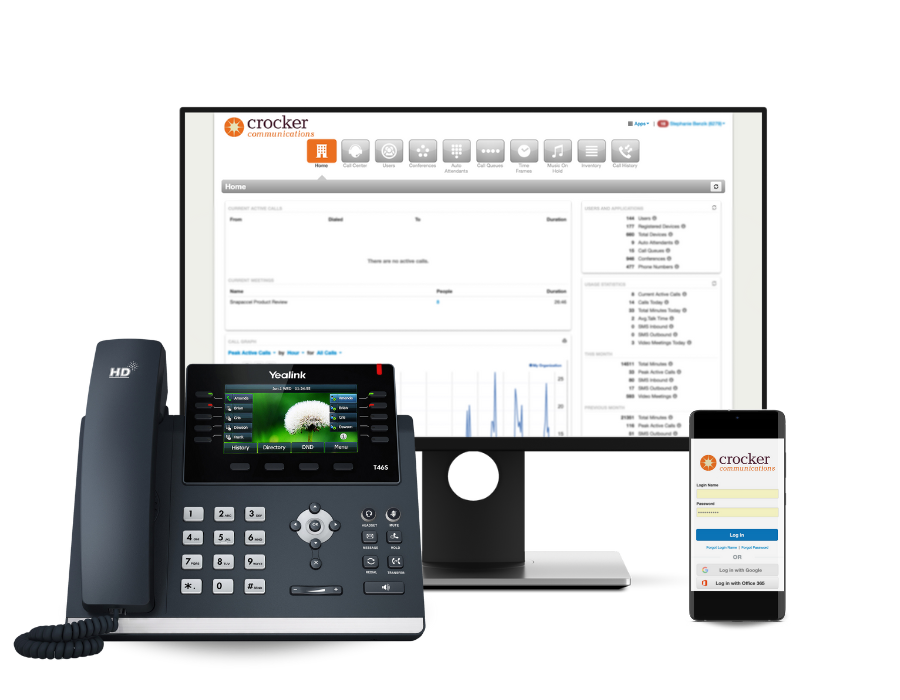If you own a business, you’ve probably asked the question: Does the phone system I choose matter? And, to answer your question, yes! Choosing the right small business phone system can make a huge difference in your internal operations.
A robust phone system enables seamless communication and plays a vital role in enhancing customer satisfaction. Today’s blog will dive deep into the need for a small business phone system, highlighting the differences between traditional VoIP and Hosted Phone Systems. We will also explore key considerations to remember when choosing a phone system and the essential steps before implementing a new solution. Welcome to your small business phone system guide!
Understanding the Options: Traditional, VoIP, and Hosted Phone Systems
There are many options out there when it comes to choosing a small business phone system. While we are often led to believe that some of these are the same, key differences make each phone system unique, and those differences could be an important factor to consider for your business. So, without further ado, here are the main types of phone systems in today’s market and what sets them apart:
- Traditional or Private Branch Exchange (PBX) systems rely on analog or digital phone lines and on-premises hardware. They offer basic features such as call transferring, voicemail, and auto attendant, but their scalability and flexibility are limited.
- Voice over Internet Protocol (VoIP) phone systems leverage the power of the Internet to transmit voice calls. These systems convert analog voice signals into digital data, allowing for more advanced features like call forwarding, video conferencing, and mobile integration. VoIP systems offer greater flexibility and scalability, making them suitable for growing businesses.
- Hosted Phone Systems are a variation of VoIP systems. Instead of investing in on-premises hardware, businesses subscribe to a service provided by a third-party vendor. Hosted systems offer the same features as VoIP systems but with the added benefit of redundancy. They ensure uninterrupted service, as PBX services like voicemail and auto attendant continue functioning even during extended power outages or other customer-side issues.

Key Considerations When Choosing a Small Business Phone System
Alright, so we’ve got the complicated part out of the way. Now that you can easily distinguish between phone systems, choosing which one would work for you might be easier, but the work is only halfway done at this point. Now you need to consider what features and characteristics are important for your small business phone system. Some things to consider include:
a) Scalability: Consider your business’s growth potential and choose a phone system that can easily accommodate increased call volumes and additional features as your business grows.
b) Budget: Evaluate each system’s upfront costs, monthly fees, and maintenance expenses. Traditional systems often involve higher upfront costs, while VoIP and Hosted systems offer cost-effective subscription-based models. Recent estimations have shown that small businesses can cut up to 75% of their overall communications costs with hosted or VoIP systems.
c) Features and Functionality: Identify the specific features your business requires, such as call forwarding, call recording, conferencing, and mobile integration. Ensure that the phone system you choose can meet your unique needs.
d) Reliability and Redundancy: Look for systems that provide geo-redundancy and disaster recovery capabilities. Hosted systems, in particular, offer enhanced reliability by ensuring uninterrupted service during power outages or other customer-side issues.
e) Integration with Existing Infrastructure: Consider how well the phone system can integrate with your existing software and hardware infrastructure. Seamless integration with customer relationship management (CRM) systems and other business tools can significantly enhance productivity.
Investing in the right small business phone system can optimize your communications, and understanding the differences between traditional VoIP and Hosted Phone Systems is crucial in making an informed decision. Considering the factors mentioned above, you can select the right phone system to meet your unique requirements.
Crocker Communications has Everything You Need:
Take your small business phone system to the next level with Crocker Communications. Our reliable, feature-rich, and customizable phone services are tailored to meet your unique needs. Trust us to provide uninterrupted connectivity, cutting-edge features, and exceptional customer support. Don’t wait – contact us today and let us transform your communication infrastructure for enhanced productivity and success.

